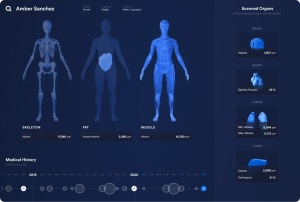por
John R. Fischer, Senior Reporter | May 10, 2021

Q Bio Gemini shows changes in real time in a person's anatomy and biochemistry in the form of a digital twin to give a comprehensive baseline view of their personal health
Q Bio launched its “digital twin” platform, Q Bio Gemini, the first of its kind for clinical use that can provide a comprehensive overview of a patient’s health in a scalable virtual model.
Q Bio Gemini is powered by the company’s Q Bio Mark I self-driving whole-body scanner, which will undergo further development along with its digital twin platform, following an investment made by Kaiser Foundation Hospitals that brings its total capital to more than $80 million. “Ultimately, our ability to digitize the human body will contribute to a greater understanding of disease progression and personalized health forecasts at scale — enabling data-driven, proactive and more affordable preventive care for all,” Q Bio founder and CEO Jeffrey Kaditz told HCB News.
Q Bio Gemini is designed to automatically construct an accurate physiological state of an individual in digital twin form to show changes in their physiology in real time. Its findings are compiled in a comprehensive summary that physicians and specialists worldwide can share.



Ad Statistics
Times Displayed: 130729
Times Visited: 7422 MIT labs, experts in Multi-Vendor component level repair of: MRI Coils, RF amplifiers, Gradient Amplifiers Contrast Media Injectors. System repairs, sub-assembly repairs, component level repairs, refurbish/calibrate. info@mitlabsusa.com/+1 (305) 470-8013
Q Bio Mark I powers the platform and is the first scanner optimized for proactive care. It is also the fastest, most accessible imaging machine developed, according to Q Bio. It collects information on an individual’s current health and personal risks and then makes real-time adaptations based on changes in their anatomy and biochemistry that are influenced by their lifestyle, medical history and genetic risk factors.
Scanning is less than 15 minutes, with no radiation or breath holds required and no claustrophobia due to its open space; including the option to stand, sit, or lie down. It also avoids bias by using no AI or machine learning, and has been shown to be at least 10 times faster than conventional MR scans without the loss of diagnostic quality. In addition, it allows for construction of cheaper hardware, with rapid deployment and reduced operations costs.
The more than $80 million racked up includes a Series B funding led by venture capital company Andreessen Horowitz. The full amount will be invested in technologies that enable Q Bio to grow its team and measure the human body more, cheaper, better and faster.
The aim, according to Kaditz, is to enhance primary care and make what he calls the “Physical of the Future” available to everyone. The concept takes into account measurements of comprehensive chemical and anatomical change in individuals that can be influenced by their lifestyle, genetic and medical history risks. It then applies them to risk stratification in the general population.
“We can build a system that prioritizes people’s care based on need rather than on a first come, first served or “who can pay more” basis,” said Kaditz. “Apart from this it will revolutionize how we measure interventions and their effectiveness.”

